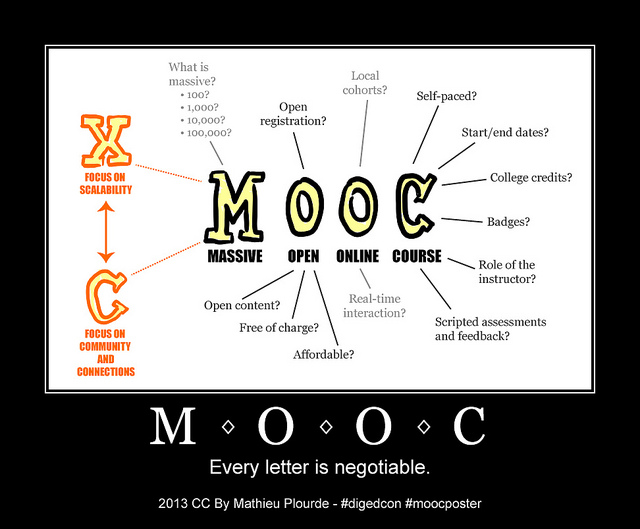Let’s play a quick a game. See if you can guess when the following passage was written and to what technology it was referring. The writer hoped that students could be taught by:
“a single inspiring teacher who speaks to the thousands of revived students through [a technology]. A whole nation of students might thus come under the stimulating touch of some great teacher.”
Maybe 2011 and MOOCs? Maybe the 1960s and television? Try the 1920s and radio, in this passage from Radiating Culture by Joseph Hart. Of course, it draws upon the same dream that we’re seeing being slapped onto MOOCs today. As a culture we seem to have a desire to have our students taught by the greatest teachers, and also assume that our students will be held rapt by these instructors.
1. Is the “Great Instructor” a Myth?
The hope that these courses will be so successful is based largely on the idea that there are exceptional instructors who can lecture in a way that will inspire all students everywhere. And certainly there are instructors out there who are better at lecturing than others. But this misses the bigger educational picture.
First, students have different learning styles. Not every student learns best from a lecture, so a radio show or a YouTube video, while it might work well for some, won’t work best for everyone. Second, and showing by influence from John Dewey, I would argue that the best education helps students connect the material to their own lives and their own interests. That simply cannot currently be done via the one-to-many model of radio and MOOC. One instructor simply can’t work at that level of detail with that many students.
To be clear, I’m not saying MOOCs will never be able to achieve this. I’ve just finished reading Automate This and I’m absolutely amazed at what algorithms can do. So perhaps one day an algorithm can tailor a lesson both to a students learning style and help them understand how it relates to their own life.
But we’re not there yet. And if we get there – it’s not a great instructor that we’re looking at anymore – it’s a great algorithm.
2. Is College for Everyone?
This argument always seems to surface in a discussion of MOOCs. Perhaps they don’t work because they’re trying to extend college to people who really shouldn’t be in college anyway.
Personally, I don’t buy it. The only reason someone shouldn’t be in college is if the education they’ve had so far hasn’t prepared them well enough. Although college can be great job training, it can be even better life training through the humanities, and that’s something I think everyone should always have access to should they desire it.
3. What’s the Difference Between MOOCs and Online Courses?
Reading comments in these discussions makes it clear that most of the public doesn’t understand the difference between an online course offered by a local university or community college, and the courses offered by places like Coursera and Udemy that feature MOOCs. Many are praising MOOCs based on their experience with traditional online courses – which misses the point of the massive in MOOC.
In a traditional online course from a university, most courses will still have relatively small teacher to student ratios. In my philosophy courses, I’ve never had over 30. And I’m expected to give feedback on assignments and respond to emails within 24 hours – all very reasonable. None of that is required or generally expected in a MOOC. The course content and the rigor is also different. You end up with things like Advanced Excel, which features 136 short videos as part of the course. Possible helpful, but also very different.
Both likely have a place – but we should be careful about understanding this difference when we discuss them.
4. Is the MOOC Movement Dying?
What was missing, many students complained, was a human connection beyond the streamed lecture.
What I’m wondering is if an algorithm will ever be able to make that human connection. It just might.
